Leadership and Management for Service Industries: The Dorchester
VerifiedAdded on 2023/01/11
|14
|3730
|42
Report
AI Summary
This report provides a comprehensive overview of leadership and management within the hospitality industry, using The Dorchester hotel as a case study. It begins by exploring classical management theories, including administrative and scientific management, and their applicability. The report then delves into different leadership styles, such as democratic and autocratic approaches, and their roles in guiding and motivating employees, developing strategies, and shaping organizational culture. It further examines the management and leadership styles practiced at The Dorchester, highlighting the use of administrative management and democratic leadership. The report also analyzes the internal and external factors that influence management styles and structures, such as mission, ownership, employee competency, industry practices, business culture, competition, and PESTLE factors. Finally, it discusses the hard and soft skills essential for effective leadership and management in the hospitality industry, covering food and beverage management, sales and marketing, and interpersonal skills.
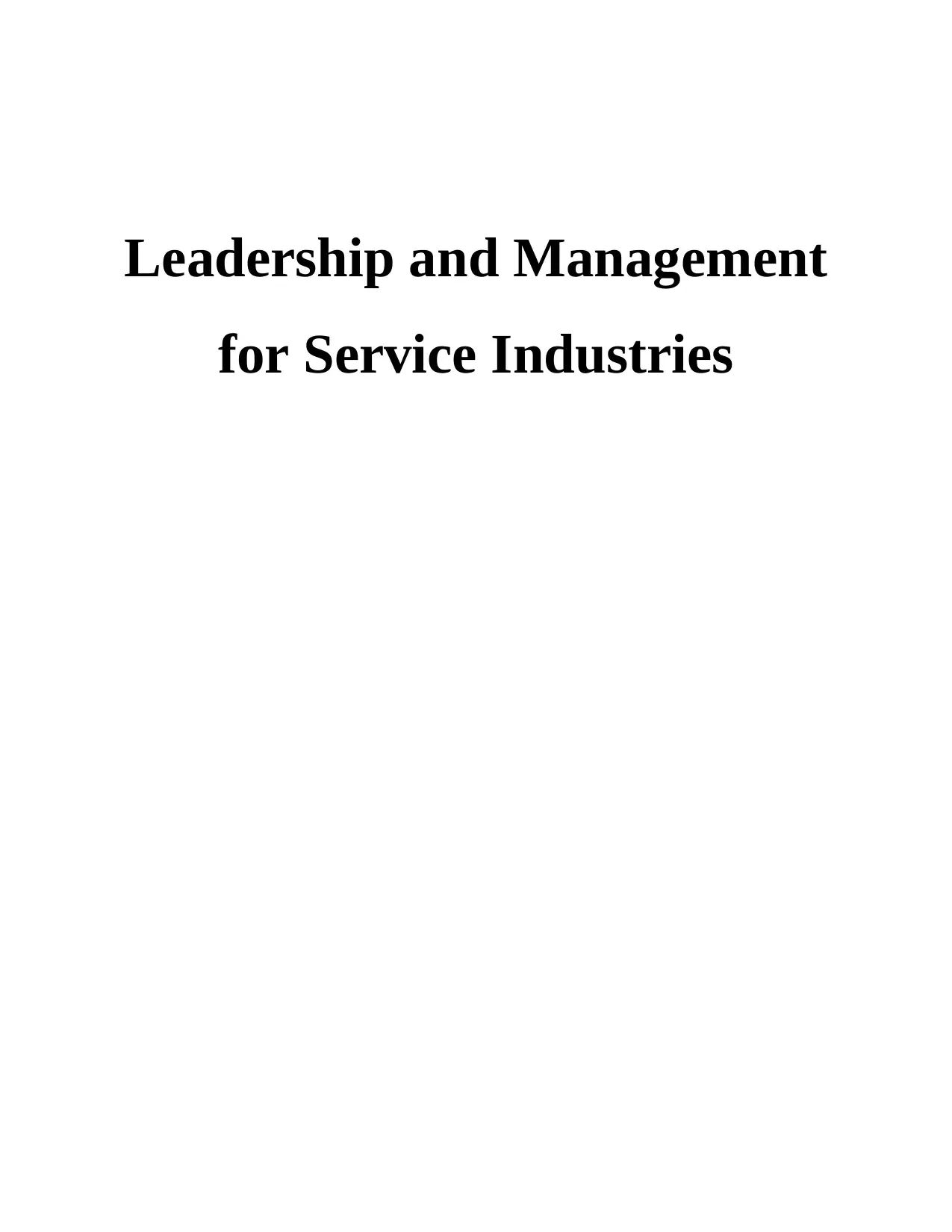
Leadership and Management
for Service Industries
for Service Industries
Paraphrase This Document
Need a fresh take? Get an instant paraphrase of this document with our AI Paraphraser
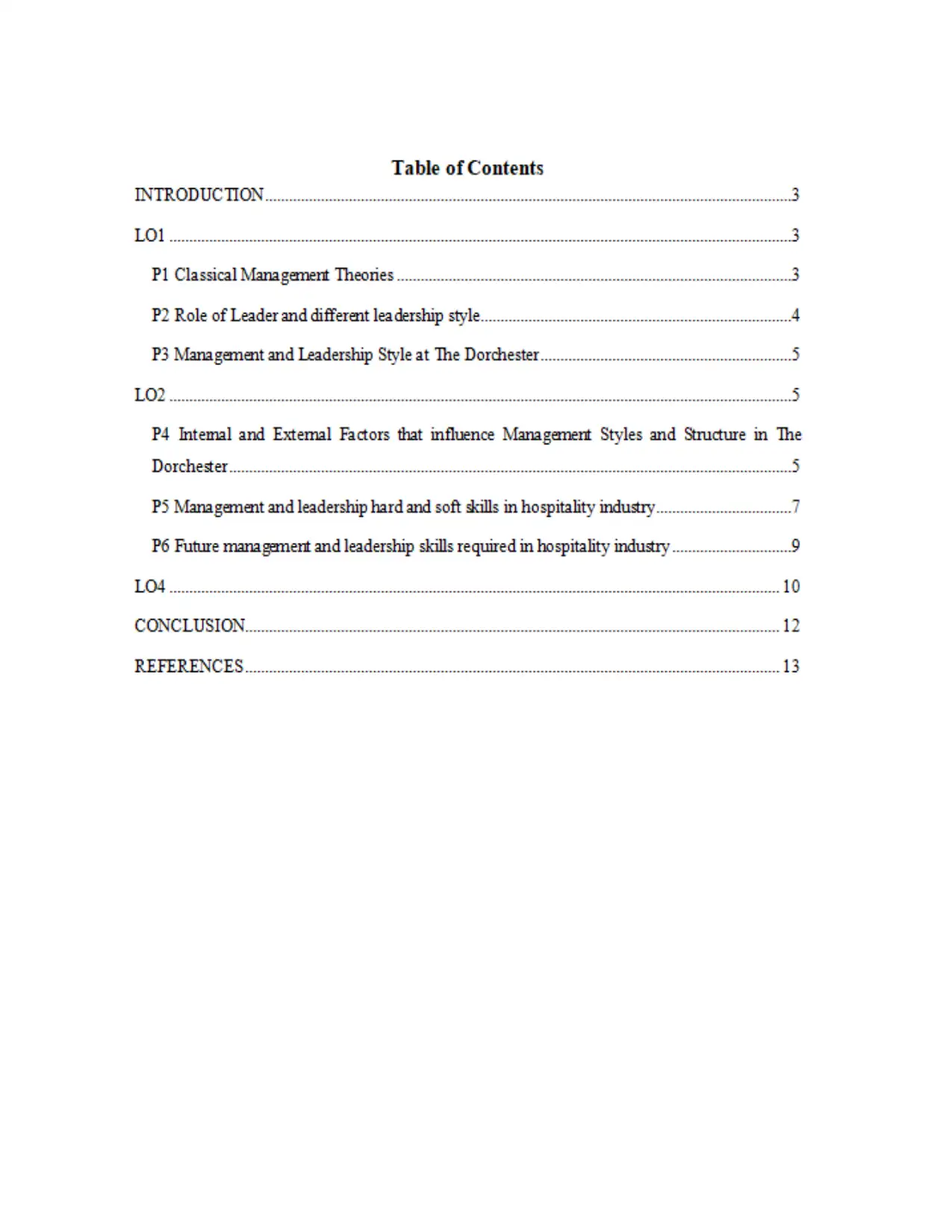
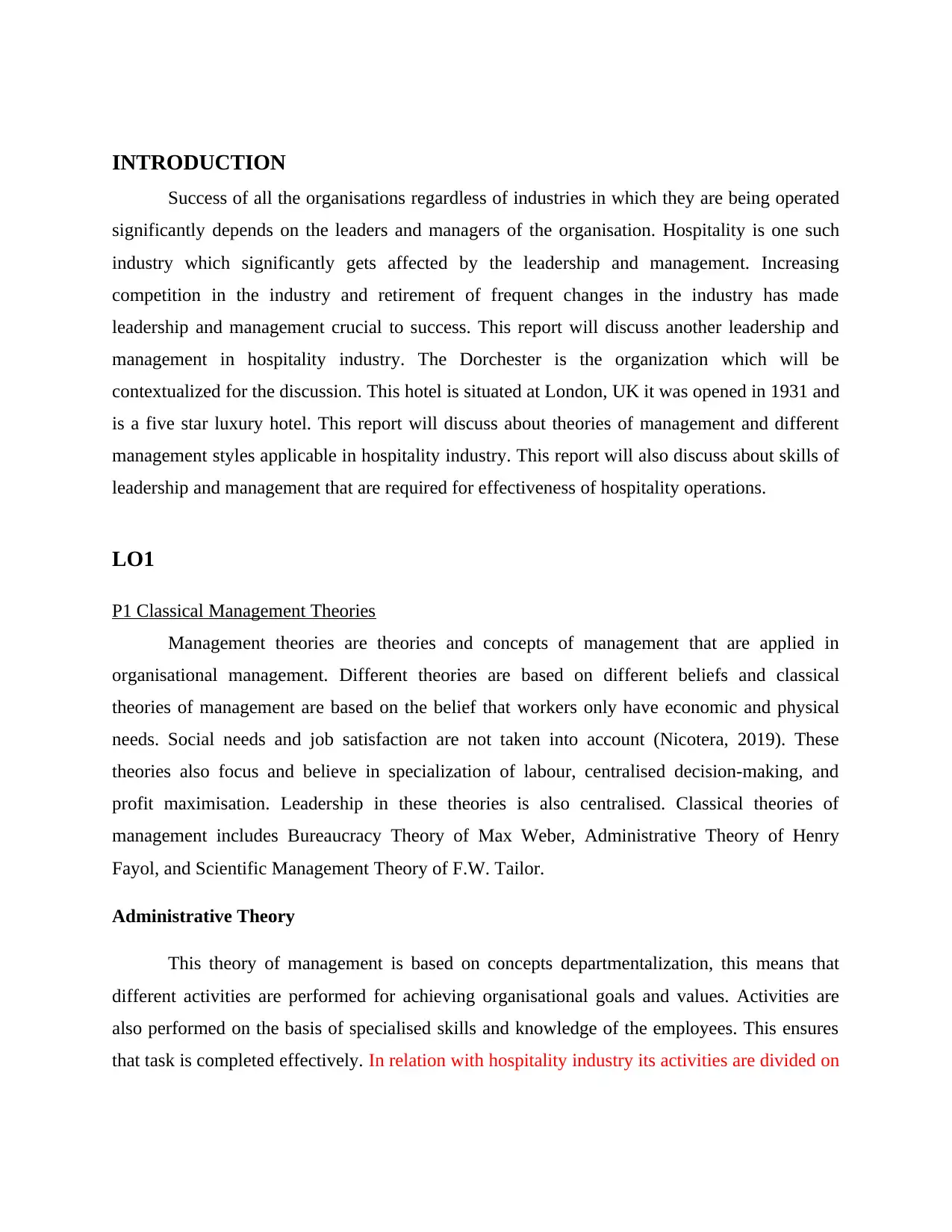
INTRODUCTION
Success of all the organisations regardless of industries in which they are being operated
significantly depends on the leaders and managers of the organisation. Hospitality is one such
industry which significantly gets affected by the leadership and management. Increasing
competition in the industry and retirement of frequent changes in the industry has made
leadership and management crucial to success. This report will discuss another leadership and
management in hospitality industry. The Dorchester is the organization which will be
contextualized for the discussion. This hotel is situated at London, UK it was opened in 1931 and
is a five star luxury hotel. This report will discuss about theories of management and different
management styles applicable in hospitality industry. This report will also discuss about skills of
leadership and management that are required for effectiveness of hospitality operations.
LO1
P1 Classical Management Theories
Management theories are theories and concepts of management that are applied in
organisational management. Different theories are based on different beliefs and classical
theories of management are based on the belief that workers only have economic and physical
needs. Social needs and job satisfaction are not taken into account (Nicotera, 2019). These
theories also focus and believe in specialization of labour, centralised decision-making, and
profit maximisation. Leadership in these theories is also centralised. Classical theories of
management includes Bureaucracy Theory of Max Weber, Administrative Theory of Henry
Fayol, and Scientific Management Theory of F.W. Tailor.
Administrative Theory
This theory of management is based on concepts departmentalization, this means that
different activities are performed for achieving organisational goals and values. Activities are
also performed on the basis of specialised skills and knowledge of the employees. This ensures
that task is completed effectively. In relation with hospitality industry its activities are divided on
Success of all the organisations regardless of industries in which they are being operated
significantly depends on the leaders and managers of the organisation. Hospitality is one such
industry which significantly gets affected by the leadership and management. Increasing
competition in the industry and retirement of frequent changes in the industry has made
leadership and management crucial to success. This report will discuss another leadership and
management in hospitality industry. The Dorchester is the organization which will be
contextualized for the discussion. This hotel is situated at London, UK it was opened in 1931 and
is a five star luxury hotel. This report will discuss about theories of management and different
management styles applicable in hospitality industry. This report will also discuss about skills of
leadership and management that are required for effectiveness of hospitality operations.
LO1
P1 Classical Management Theories
Management theories are theories and concepts of management that are applied in
organisational management. Different theories are based on different beliefs and classical
theories of management are based on the belief that workers only have economic and physical
needs. Social needs and job satisfaction are not taken into account (Nicotera, 2019). These
theories also focus and believe in specialization of labour, centralised decision-making, and
profit maximisation. Leadership in these theories is also centralised. Classical theories of
management includes Bureaucracy Theory of Max Weber, Administrative Theory of Henry
Fayol, and Scientific Management Theory of F.W. Tailor.
Administrative Theory
This theory of management is based on concepts departmentalization, this means that
different activities are performed for achieving organisational goals and values. Activities are
also performed on the basis of specialised skills and knowledge of the employees. This ensures
that task is completed effectively. In relation with hospitality industry its activities are divided on
⊘ This is a preview!⊘
Do you want full access?
Subscribe today to unlock all pages.

Trusted by 1+ million students worldwide
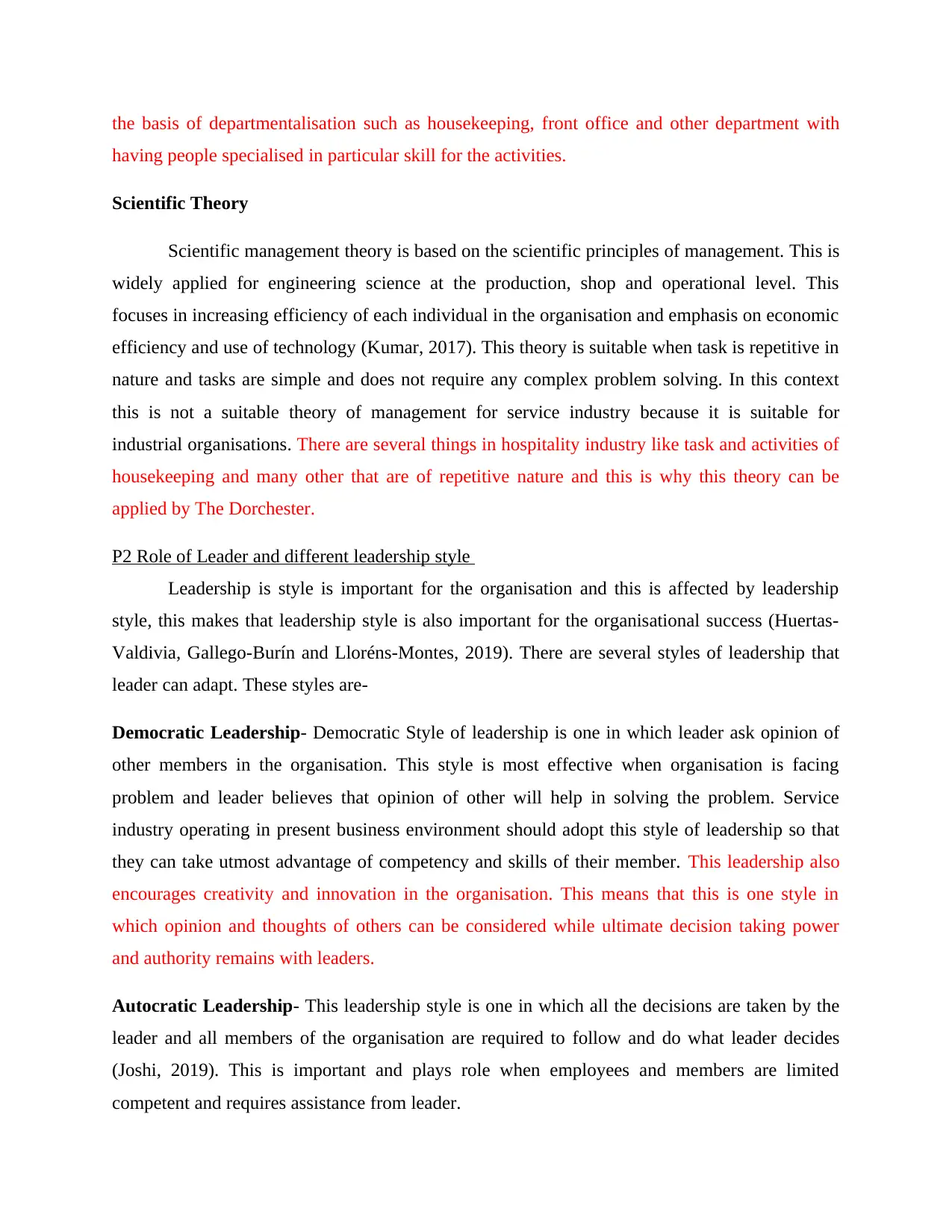
the basis of departmentalisation such as housekeeping, front office and other department with
having people specialised in particular skill for the activities.
Scientific Theory
Scientific management theory is based on the scientific principles of management. This is
widely applied for engineering science at the production, shop and operational level. This
focuses in increasing efficiency of each individual in the organisation and emphasis on economic
efficiency and use of technology (Kumar, 2017). This theory is suitable when task is repetitive in
nature and tasks are simple and does not require any complex problem solving. In this context
this is not a suitable theory of management for service industry because it is suitable for
industrial organisations. There are several things in hospitality industry like task and activities of
housekeeping and many other that are of repetitive nature and this is why this theory can be
applied by The Dorchester.
P2 Role of Leader and different leadership style
Leadership is style is important for the organisation and this is affected by leadership
style, this makes that leadership style is also important for the organisational success (Huertas-
Valdivia, Gallego-Burín and Lloréns-Montes, 2019). There are several styles of leadership that
leader can adapt. These styles are-
Democratic Leadership- Democratic Style of leadership is one in which leader ask opinion of
other members in the organisation. This style is most effective when organisation is facing
problem and leader believes that opinion of other will help in solving the problem. Service
industry operating in present business environment should adopt this style of leadership so that
they can take utmost advantage of competency and skills of their member. This leadership also
encourages creativity and innovation in the organisation. This means that this is one style in
which opinion and thoughts of others can be considered while ultimate decision taking power
and authority remains with leaders.
Autocratic Leadership- This leadership style is one in which all the decisions are taken by the
leader and all members of the organisation are required to follow and do what leader decides
(Joshi, 2019). This is important and plays role when employees and members are limited
competent and requires assistance from leader.
having people specialised in particular skill for the activities.
Scientific Theory
Scientific management theory is based on the scientific principles of management. This is
widely applied for engineering science at the production, shop and operational level. This
focuses in increasing efficiency of each individual in the organisation and emphasis on economic
efficiency and use of technology (Kumar, 2017). This theory is suitable when task is repetitive in
nature and tasks are simple and does not require any complex problem solving. In this context
this is not a suitable theory of management for service industry because it is suitable for
industrial organisations. There are several things in hospitality industry like task and activities of
housekeeping and many other that are of repetitive nature and this is why this theory can be
applied by The Dorchester.
P2 Role of Leader and different leadership style
Leadership is style is important for the organisation and this is affected by leadership
style, this makes that leadership style is also important for the organisational success (Huertas-
Valdivia, Gallego-Burín and Lloréns-Montes, 2019). There are several styles of leadership that
leader can adapt. These styles are-
Democratic Leadership- Democratic Style of leadership is one in which leader ask opinion of
other members in the organisation. This style is most effective when organisation is facing
problem and leader believes that opinion of other will help in solving the problem. Service
industry operating in present business environment should adopt this style of leadership so that
they can take utmost advantage of competency and skills of their member. This leadership also
encourages creativity and innovation in the organisation. This means that this is one style in
which opinion and thoughts of others can be considered while ultimate decision taking power
and authority remains with leaders.
Autocratic Leadership- This leadership style is one in which all the decisions are taken by the
leader and all members of the organisation are required to follow and do what leader decides
(Joshi, 2019). This is important and plays role when employees and members are limited
competent and requires assistance from leader.
Paraphrase This Document
Need a fresh take? Get an instant paraphrase of this document with our AI Paraphraser
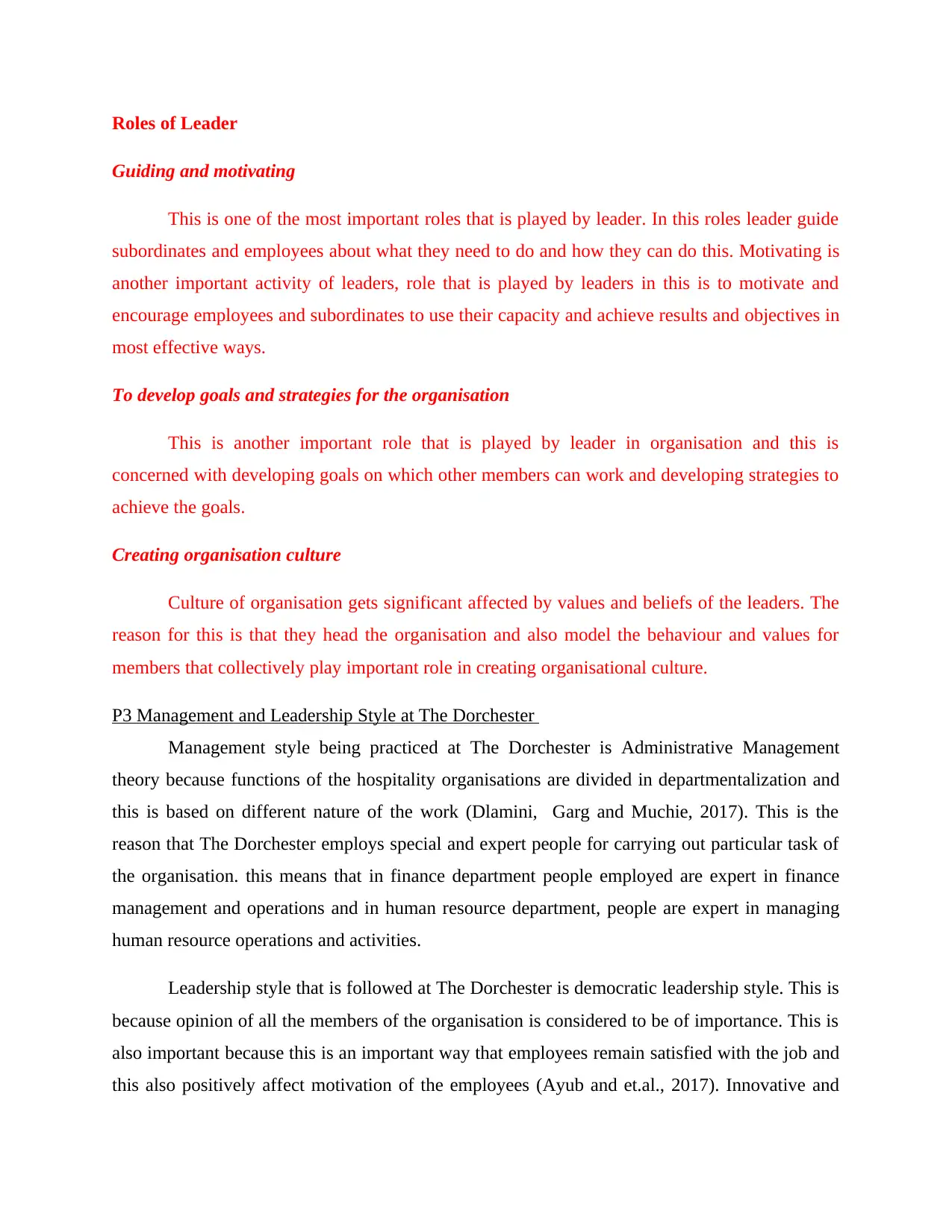
Roles of Leader
Guiding and motivating
This is one of the most important roles that is played by leader. In this roles leader guide
subordinates and employees about what they need to do and how they can do this. Motivating is
another important activity of leaders, role that is played by leaders in this is to motivate and
encourage employees and subordinates to use their capacity and achieve results and objectives in
most effective ways.
To develop goals and strategies for the organisation
This is another important role that is played by leader in organisation and this is
concerned with developing goals on which other members can work and developing strategies to
achieve the goals.
Creating organisation culture
Culture of organisation gets significant affected by values and beliefs of the leaders. The
reason for this is that they head the organisation and also model the behaviour and values for
members that collectively play important role in creating organisational culture.
P3 Management and Leadership Style at The Dorchester
Management style being practiced at The Dorchester is Administrative Management
theory because functions of the hospitality organisations are divided in departmentalization and
this is based on different nature of the work (Dlamini, Garg and Muchie, 2017). This is the
reason that The Dorchester employs special and expert people for carrying out particular task of
the organisation. this means that in finance department people employed are expert in finance
management and operations and in human resource department, people are expert in managing
human resource operations and activities.
Leadership style that is followed at The Dorchester is democratic leadership style. This is
because opinion of all the members of the organisation is considered to be of importance. This is
also important because this is an important way that employees remain satisfied with the job and
this also positively affect motivation of the employees (Ayub and et.al., 2017). Innovative and
Guiding and motivating
This is one of the most important roles that is played by leader. In this roles leader guide
subordinates and employees about what they need to do and how they can do this. Motivating is
another important activity of leaders, role that is played by leaders in this is to motivate and
encourage employees and subordinates to use their capacity and achieve results and objectives in
most effective ways.
To develop goals and strategies for the organisation
This is another important role that is played by leader in organisation and this is
concerned with developing goals on which other members can work and developing strategies to
achieve the goals.
Creating organisation culture
Culture of organisation gets significant affected by values and beliefs of the leaders. The
reason for this is that they head the organisation and also model the behaviour and values for
members that collectively play important role in creating organisational culture.
P3 Management and Leadership Style at The Dorchester
Management style being practiced at The Dorchester is Administrative Management
theory because functions of the hospitality organisations are divided in departmentalization and
this is based on different nature of the work (Dlamini, Garg and Muchie, 2017). This is the
reason that The Dorchester employs special and expert people for carrying out particular task of
the organisation. this means that in finance department people employed are expert in finance
management and operations and in human resource department, people are expert in managing
human resource operations and activities.
Leadership style that is followed at The Dorchester is democratic leadership style. This is
because opinion of all the members of the organisation is considered to be of importance. This is
also important because this is an important way that employees remain satisfied with the job and
this also positively affect motivation of the employees (Ayub and et.al., 2017). Innovative and
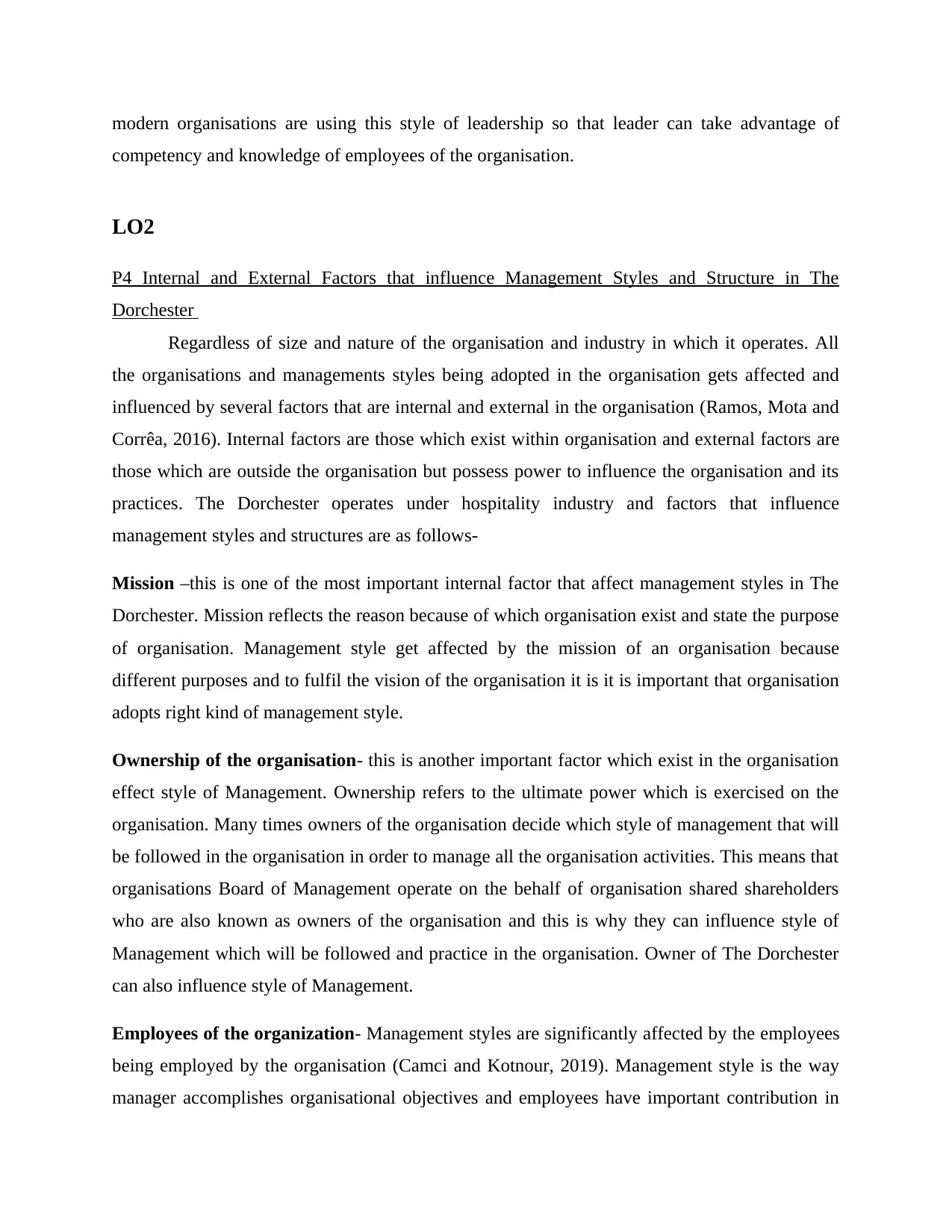
modern organisations are using this style of leadership so that leader can take advantage of
competency and knowledge of employees of the organisation.
LO2
P4 Internal and External Factors that influence Management Styles and Structure in The
Dorchester
Regardless of size and nature of the organisation and industry in which it operates. All
the organisations and managements styles being adopted in the organisation gets affected and
influenced by several factors that are internal and external in the organisation (Ramos, Mota and
Corrêa, 2016). Internal factors are those which exist within organisation and external factors are
those which are outside the organisation but possess power to influence the organisation and its
practices. The Dorchester operates under hospitality industry and factors that influence
management styles and structures are as follows-
Mission –this is one of the most important internal factor that affect management styles in The
Dorchester. Mission reflects the reason because of which organisation exist and state the purpose
of organisation. Management style get affected by the mission of an organisation because
different purposes and to fulfil the vision of the organisation it is it is important that organisation
adopts right kind of management style.
Ownership of the organisation- this is another important factor which exist in the organisation
effect style of Management. Ownership refers to the ultimate power which is exercised on the
organisation. Many times owners of the organisation decide which style of management that will
be followed in the organisation in order to manage all the organisation activities. This means that
organisations Board of Management operate on the behalf of organisation shared shareholders
who are also known as owners of the organisation and this is why they can influence style of
Management which will be followed and practice in the organisation. Owner of The Dorchester
can also influence style of Management.
Employees of the organization- Management styles are significantly affected by the employees
being employed by the organisation (Camci and Kotnour, 2019). Management style is the way
manager accomplishes organisational objectives and employees have important contribution in
competency and knowledge of employees of the organisation.
LO2
P4 Internal and External Factors that influence Management Styles and Structure in The
Dorchester
Regardless of size and nature of the organisation and industry in which it operates. All
the organisations and managements styles being adopted in the organisation gets affected and
influenced by several factors that are internal and external in the organisation (Ramos, Mota and
Corrêa, 2016). Internal factors are those which exist within organisation and external factors are
those which are outside the organisation but possess power to influence the organisation and its
practices. The Dorchester operates under hospitality industry and factors that influence
management styles and structures are as follows-
Mission –this is one of the most important internal factor that affect management styles in The
Dorchester. Mission reflects the reason because of which organisation exist and state the purpose
of organisation. Management style get affected by the mission of an organisation because
different purposes and to fulfil the vision of the organisation it is it is important that organisation
adopts right kind of management style.
Ownership of the organisation- this is another important factor which exist in the organisation
effect style of Management. Ownership refers to the ultimate power which is exercised on the
organisation. Many times owners of the organisation decide which style of management that will
be followed in the organisation in order to manage all the organisation activities. This means that
organisations Board of Management operate on the behalf of organisation shared shareholders
who are also known as owners of the organisation and this is why they can influence style of
Management which will be followed and practice in the organisation. Owner of The Dorchester
can also influence style of Management.
Employees of the organization- Management styles are significantly affected by the employees
being employed by the organisation (Camci and Kotnour, 2019). Management style is the way
manager accomplishes organisational objectives and employees have important contribution in
⊘ This is a preview!⊘
Do you want full access?
Subscribe today to unlock all pages.

Trusted by 1+ million students worldwide
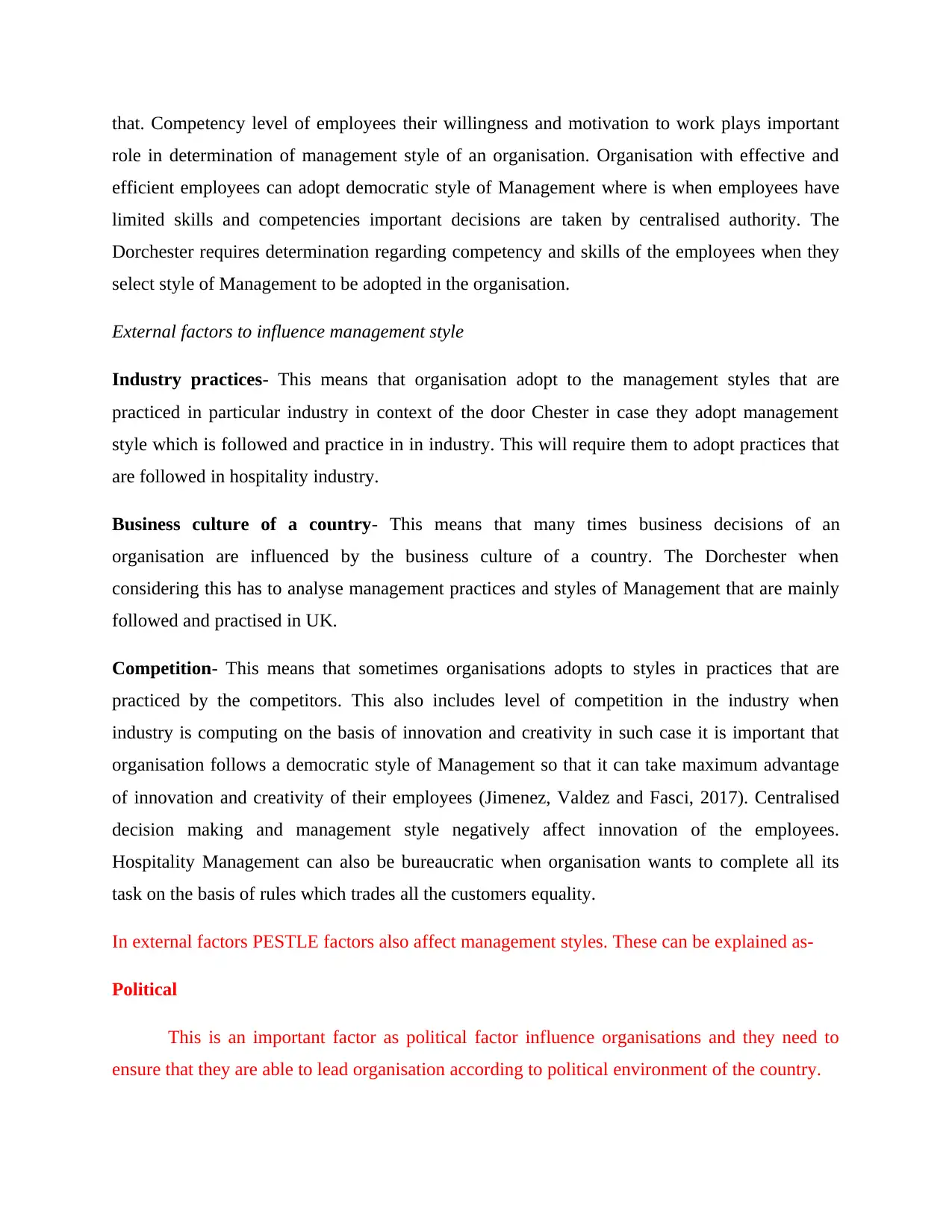
that. Competency level of employees their willingness and motivation to work plays important
role in determination of management style of an organisation. Organisation with effective and
efficient employees can adopt democratic style of Management where is when employees have
limited skills and competencies important decisions are taken by centralised authority. The
Dorchester requires determination regarding competency and skills of the employees when they
select style of Management to be adopted in the organisation.
External factors to influence management style
Industry practices- This means that organisation adopt to the management styles that are
practiced in particular industry in context of the door Chester in case they adopt management
style which is followed and practice in in industry. This will require them to adopt practices that
are followed in hospitality industry.
Business culture of a country- This means that many times business decisions of an
organisation are influenced by the business culture of a country. The Dorchester when
considering this has to analyse management practices and styles of Management that are mainly
followed and practised in UK.
Competition- This means that sometimes organisations adopts to styles in practices that are
practiced by the competitors. This also includes level of competition in the industry when
industry is computing on the basis of innovation and creativity in such case it is important that
organisation follows a democratic style of Management so that it can take maximum advantage
of innovation and creativity of their employees (Jimenez, Valdez and Fasci, 2017). Centralised
decision making and management style negatively affect innovation of the employees.
Hospitality Management can also be bureaucratic when organisation wants to complete all its
task on the basis of rules which trades all the customers equality.
In external factors PESTLE factors also affect management styles. These can be explained as-
Political
This is an important factor as political factor influence organisations and they need to
ensure that they are able to lead organisation according to political environment of the country.
role in determination of management style of an organisation. Organisation with effective and
efficient employees can adopt democratic style of Management where is when employees have
limited skills and competencies important decisions are taken by centralised authority. The
Dorchester requires determination regarding competency and skills of the employees when they
select style of Management to be adopted in the organisation.
External factors to influence management style
Industry practices- This means that organisation adopt to the management styles that are
practiced in particular industry in context of the door Chester in case they adopt management
style which is followed and practice in in industry. This will require them to adopt practices that
are followed in hospitality industry.
Business culture of a country- This means that many times business decisions of an
organisation are influenced by the business culture of a country. The Dorchester when
considering this has to analyse management practices and styles of Management that are mainly
followed and practised in UK.
Competition- This means that sometimes organisations adopts to styles in practices that are
practiced by the competitors. This also includes level of competition in the industry when
industry is computing on the basis of innovation and creativity in such case it is important that
organisation follows a democratic style of Management so that it can take maximum advantage
of innovation and creativity of their employees (Jimenez, Valdez and Fasci, 2017). Centralised
decision making and management style negatively affect innovation of the employees.
Hospitality Management can also be bureaucratic when organisation wants to complete all its
task on the basis of rules which trades all the customers equality.
In external factors PESTLE factors also affect management styles. These can be explained as-
Political
This is an important factor as political factor influence organisations and they need to
ensure that they are able to lead organisation according to political environment of the country.
Paraphrase This Document
Need a fresh take? Get an instant paraphrase of this document with our AI Paraphraser
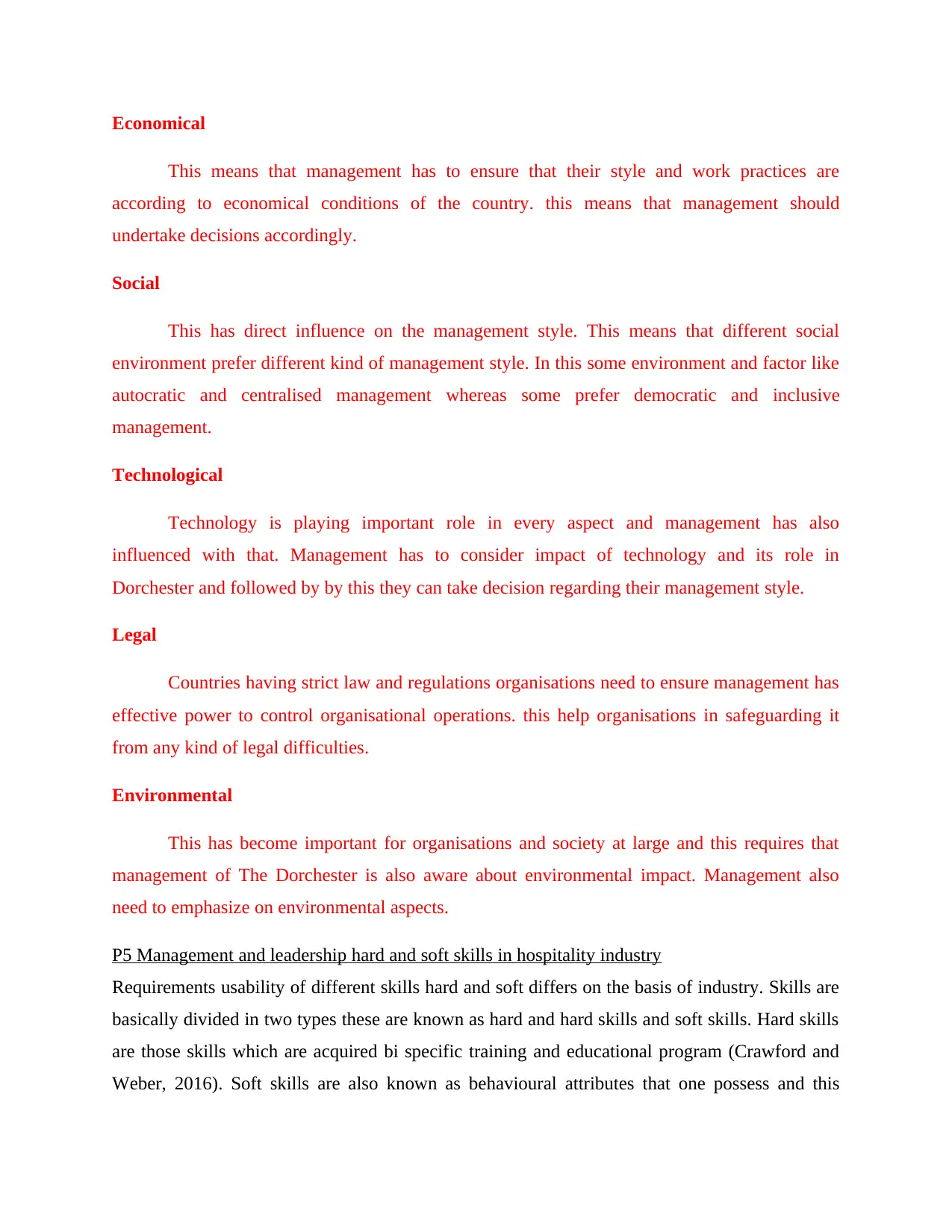
Economical
This means that management has to ensure that their style and work practices are
according to economical conditions of the country. this means that management should
undertake decisions accordingly.
Social
This has direct influence on the management style. This means that different social
environment prefer different kind of management style. In this some environment and factor like
autocratic and centralised management whereas some prefer democratic and inclusive
management.
Technological
Technology is playing important role in every aspect and management has also
influenced with that. Management has to consider impact of technology and its role in
Dorchester and followed by by this they can take decision regarding their management style.
Legal
Countries having strict law and regulations organisations need to ensure management has
effective power to control organisational operations. this help organisations in safeguarding it
from any kind of legal difficulties.
Environmental
This has become important for organisations and society at large and this requires that
management of The Dorchester is also aware about environmental impact. Management also
need to emphasize on environmental aspects.
P5 Management and leadership hard and soft skills in hospitality industry
Requirements usability of different skills hard and soft differs on the basis of industry. Skills are
basically divided in two types these are known as hard and hard skills and soft skills. Hard skills
are those skills which are acquired bi specific training and educational program (Crawford and
Weber, 2016). Soft skills are also known as behavioural attributes that one possess and this
This means that management has to ensure that their style and work practices are
according to economical conditions of the country. this means that management should
undertake decisions accordingly.
Social
This has direct influence on the management style. This means that different social
environment prefer different kind of management style. In this some environment and factor like
autocratic and centralised management whereas some prefer democratic and inclusive
management.
Technological
Technology is playing important role in every aspect and management has also
influenced with that. Management has to consider impact of technology and its role in
Dorchester and followed by by this they can take decision regarding their management style.
Legal
Countries having strict law and regulations organisations need to ensure management has
effective power to control organisational operations. this help organisations in safeguarding it
from any kind of legal difficulties.
Environmental
This has become important for organisations and society at large and this requires that
management of The Dorchester is also aware about environmental impact. Management also
need to emphasize on environmental aspects.
P5 Management and leadership hard and soft skills in hospitality industry
Requirements usability of different skills hard and soft differs on the basis of industry. Skills are
basically divided in two types these are known as hard and hard skills and soft skills. Hard skills
are those skills which are acquired bi specific training and educational program (Crawford and
Weber, 2016). Soft skills are also known as behavioural attributes that one possess and this
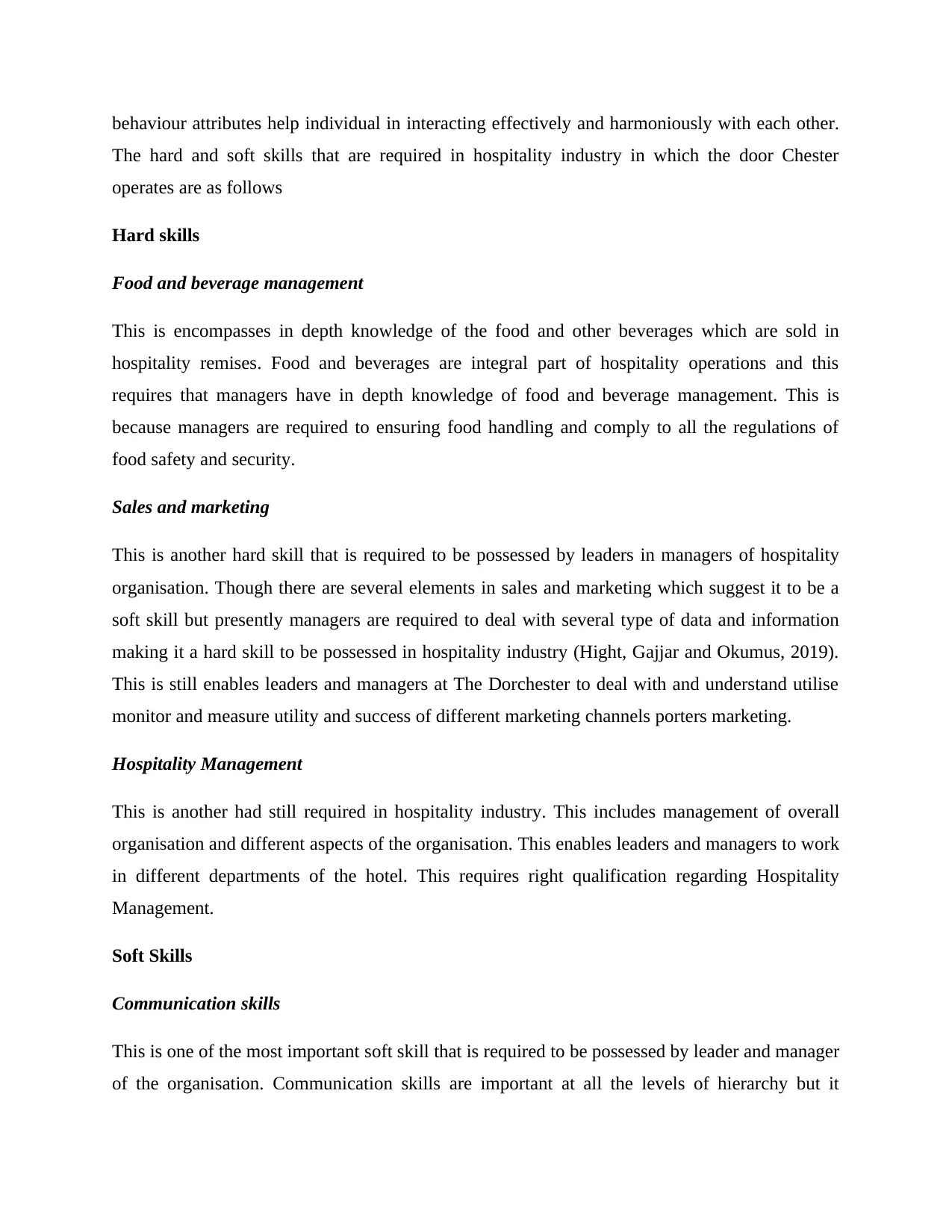
behaviour attributes help individual in interacting effectively and harmoniously with each other.
The hard and soft skills that are required in hospitality industry in which the door Chester
operates are as follows
Hard skills
Food and beverage management
This is encompasses in depth knowledge of the food and other beverages which are sold in
hospitality remises. Food and beverages are integral part of hospitality operations and this
requires that managers have in depth knowledge of food and beverage management. This is
because managers are required to ensuring food handling and comply to all the regulations of
food safety and security.
Sales and marketing
This is another hard skill that is required to be possessed by leaders in managers of hospitality
organisation. Though there are several elements in sales and marketing which suggest it to be a
soft skill but presently managers are required to deal with several type of data and information
making it a hard skill to be possessed in hospitality industry (Hight, Gajjar and Okumus, 2019).
This is still enables leaders and managers at The Dorchester to deal with and understand utilise
monitor and measure utility and success of different marketing channels porters marketing.
Hospitality Management
This is another had still required in hospitality industry. This includes management of overall
organisation and different aspects of the organisation. This enables leaders and managers to work
in different departments of the hotel. This requires right qualification regarding Hospitality
Management.
Soft Skills
Communication skills
This is one of the most important soft skill that is required to be possessed by leader and manager
of the organisation. Communication skills are important at all the levels of hierarchy but it
The hard and soft skills that are required in hospitality industry in which the door Chester
operates are as follows
Hard skills
Food and beverage management
This is encompasses in depth knowledge of the food and other beverages which are sold in
hospitality remises. Food and beverages are integral part of hospitality operations and this
requires that managers have in depth knowledge of food and beverage management. This is
because managers are required to ensuring food handling and comply to all the regulations of
food safety and security.
Sales and marketing
This is another hard skill that is required to be possessed by leaders in managers of hospitality
organisation. Though there are several elements in sales and marketing which suggest it to be a
soft skill but presently managers are required to deal with several type of data and information
making it a hard skill to be possessed in hospitality industry (Hight, Gajjar and Okumus, 2019).
This is still enables leaders and managers at The Dorchester to deal with and understand utilise
monitor and measure utility and success of different marketing channels porters marketing.
Hospitality Management
This is another had still required in hospitality industry. This includes management of overall
organisation and different aspects of the organisation. This enables leaders and managers to work
in different departments of the hotel. This requires right qualification regarding Hospitality
Management.
Soft Skills
Communication skills
This is one of the most important soft skill that is required to be possessed by leader and manager
of the organisation. Communication skills are important at all the levels of hierarchy but it
⊘ This is a preview!⊘
Do you want full access?
Subscribe today to unlock all pages.

Trusted by 1+ million students worldwide
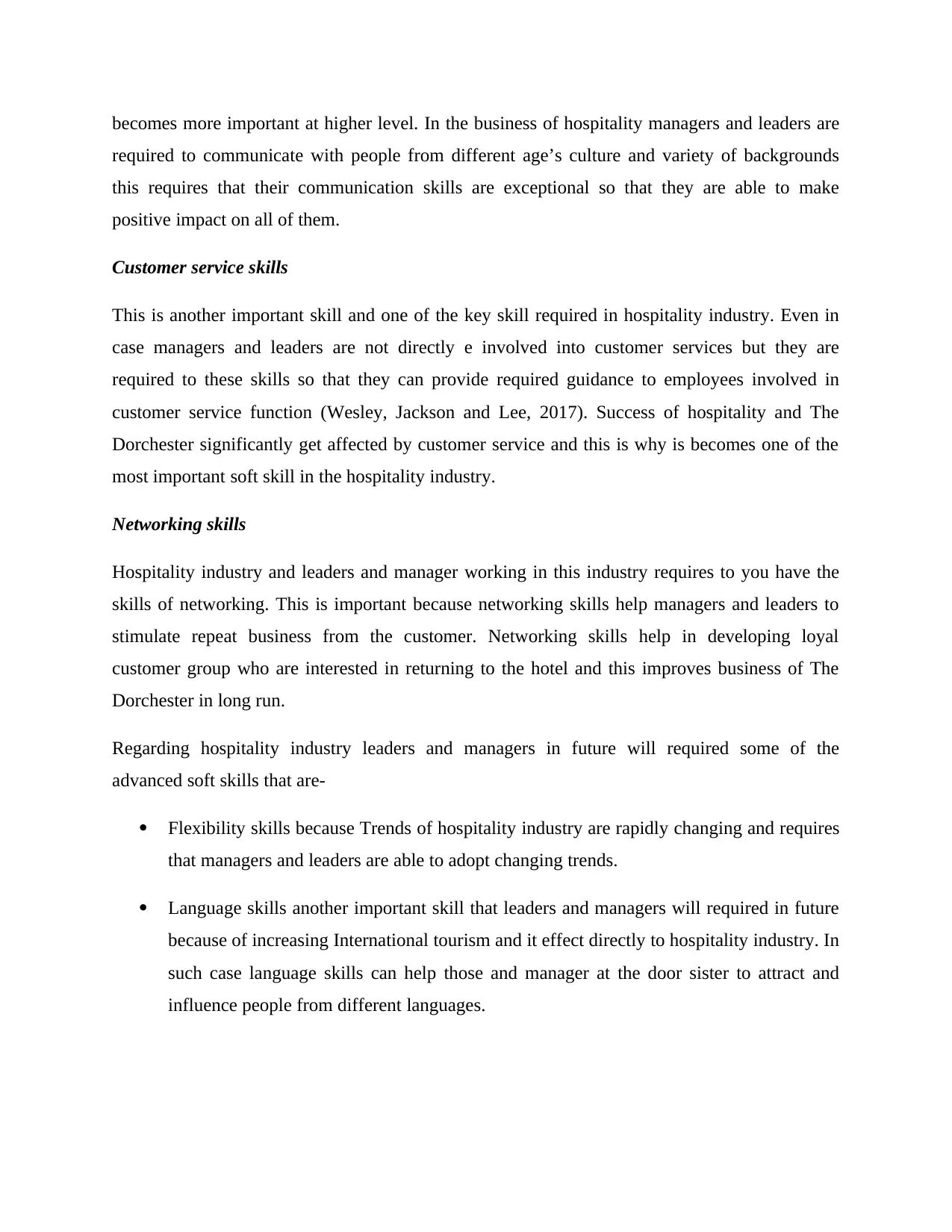
becomes more important at higher level. In the business of hospitality managers and leaders are
required to communicate with people from different age’s culture and variety of backgrounds
this requires that their communication skills are exceptional so that they are able to make
positive impact on all of them.
Customer service skills
This is another important skill and one of the key skill required in hospitality industry. Even in
case managers and leaders are not directly e involved into customer services but they are
required to these skills so that they can provide required guidance to employees involved in
customer service function (Wesley, Jackson and Lee, 2017). Success of hospitality and The
Dorchester significantly get affected by customer service and this is why is becomes one of the
most important soft skill in the hospitality industry.
Networking skills
Hospitality industry and leaders and manager working in this industry requires to you have the
skills of networking. This is important because networking skills help managers and leaders to
stimulate repeat business from the customer. Networking skills help in developing loyal
customer group who are interested in returning to the hotel and this improves business of The
Dorchester in long run.
Regarding hospitality industry leaders and managers in future will required some of the
advanced soft skills that are-
Flexibility skills because Trends of hospitality industry are rapidly changing and requires
that managers and leaders are able to adopt changing trends.
Language skills another important skill that leaders and managers will required in future
because of increasing International tourism and it effect directly to hospitality industry. In
such case language skills can help those and manager at the door sister to attract and
influence people from different languages.
required to communicate with people from different age’s culture and variety of backgrounds
this requires that their communication skills are exceptional so that they are able to make
positive impact on all of them.
Customer service skills
This is another important skill and one of the key skill required in hospitality industry. Even in
case managers and leaders are not directly e involved into customer services but they are
required to these skills so that they can provide required guidance to employees involved in
customer service function (Wesley, Jackson and Lee, 2017). Success of hospitality and The
Dorchester significantly get affected by customer service and this is why is becomes one of the
most important soft skill in the hospitality industry.
Networking skills
Hospitality industry and leaders and manager working in this industry requires to you have the
skills of networking. This is important because networking skills help managers and leaders to
stimulate repeat business from the customer. Networking skills help in developing loyal
customer group who are interested in returning to the hotel and this improves business of The
Dorchester in long run.
Regarding hospitality industry leaders and managers in future will required some of the
advanced soft skills that are-
Flexibility skills because Trends of hospitality industry are rapidly changing and requires
that managers and leaders are able to adopt changing trends.
Language skills another important skill that leaders and managers will required in future
because of increasing International tourism and it effect directly to hospitality industry. In
such case language skills can help those and manager at the door sister to attract and
influence people from different languages.
Paraphrase This Document
Need a fresh take? Get an instant paraphrase of this document with our AI Paraphraser
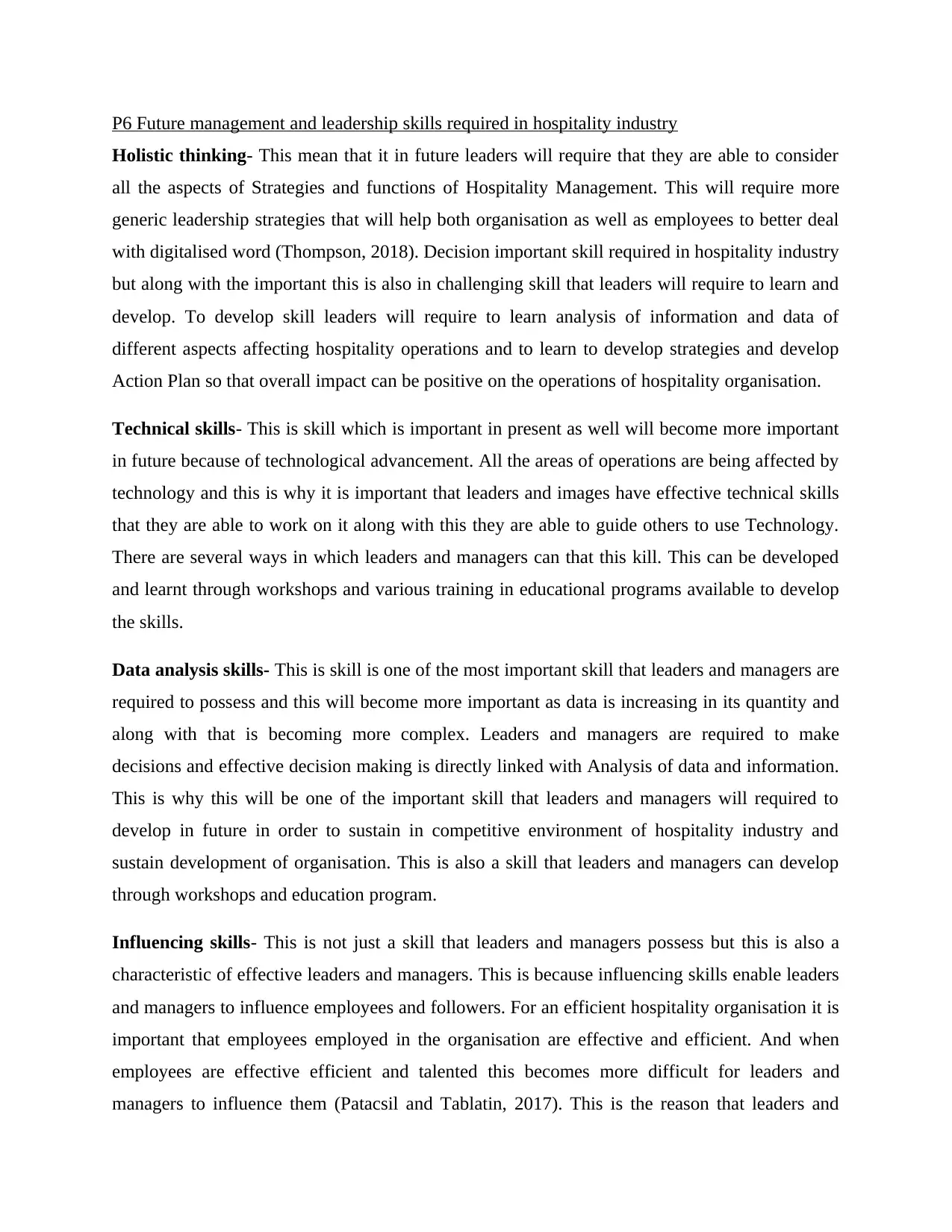
P6 Future management and leadership skills required in hospitality industry
Holistic thinking- This mean that it in future leaders will require that they are able to consider
all the aspects of Strategies and functions of Hospitality Management. This will require more
generic leadership strategies that will help both organisation as well as employees to better deal
with digitalised word (Thompson, 2018). Decision important skill required in hospitality industry
but along with the important this is also in challenging skill that leaders will require to learn and
develop. To develop skill leaders will require to learn analysis of information and data of
different aspects affecting hospitality operations and to learn to develop strategies and develop
Action Plan so that overall impact can be positive on the operations of hospitality organisation.
Technical skills- This is skill which is important in present as well will become more important
in future because of technological advancement. All the areas of operations are being affected by
technology and this is why it is important that leaders and images have effective technical skills
that they are able to work on it along with this they are able to guide others to use Technology.
There are several ways in which leaders and managers can that this kill. This can be developed
and learnt through workshops and various training in educational programs available to develop
the skills.
Data analysis skills- This is skill is one of the most important skill that leaders and managers are
required to possess and this will become more important as data is increasing in its quantity and
along with that is becoming more complex. Leaders and managers are required to make
decisions and effective decision making is directly linked with Analysis of data and information.
This is why this will be one of the important skill that leaders and managers will required to
develop in future in order to sustain in competitive environment of hospitality industry and
sustain development of organisation. This is also a skill that leaders and managers can develop
through workshops and education program.
Influencing skills- This is not just a skill that leaders and managers possess but this is also a
characteristic of effective leaders and managers. This is because influencing skills enable leaders
and managers to influence employees and followers. For an efficient hospitality organisation it is
important that employees employed in the organisation are effective and efficient. And when
employees are effective efficient and talented this becomes more difficult for leaders and
managers to influence them (Patacsil and Tablatin, 2017). This is the reason that leaders and
Holistic thinking- This mean that it in future leaders will require that they are able to consider
all the aspects of Strategies and functions of Hospitality Management. This will require more
generic leadership strategies that will help both organisation as well as employees to better deal
with digitalised word (Thompson, 2018). Decision important skill required in hospitality industry
but along with the important this is also in challenging skill that leaders will require to learn and
develop. To develop skill leaders will require to learn analysis of information and data of
different aspects affecting hospitality operations and to learn to develop strategies and develop
Action Plan so that overall impact can be positive on the operations of hospitality organisation.
Technical skills- This is skill which is important in present as well will become more important
in future because of technological advancement. All the areas of operations are being affected by
technology and this is why it is important that leaders and images have effective technical skills
that they are able to work on it along with this they are able to guide others to use Technology.
There are several ways in which leaders and managers can that this kill. This can be developed
and learnt through workshops and various training in educational programs available to develop
the skills.
Data analysis skills- This is skill is one of the most important skill that leaders and managers are
required to possess and this will become more important as data is increasing in its quantity and
along with that is becoming more complex. Leaders and managers are required to make
decisions and effective decision making is directly linked with Analysis of data and information.
This is why this will be one of the important skill that leaders and managers will required to
develop in future in order to sustain in competitive environment of hospitality industry and
sustain development of organisation. This is also a skill that leaders and managers can develop
through workshops and education program.
Influencing skills- This is not just a skill that leaders and managers possess but this is also a
characteristic of effective leaders and managers. This is because influencing skills enable leaders
and managers to influence employees and followers. For an efficient hospitality organisation it is
important that employees employed in the organisation are effective and efficient. And when
employees are effective efficient and talented this becomes more difficult for leaders and
managers to influence them (Patacsil and Tablatin, 2017). This is the reason that leaders and
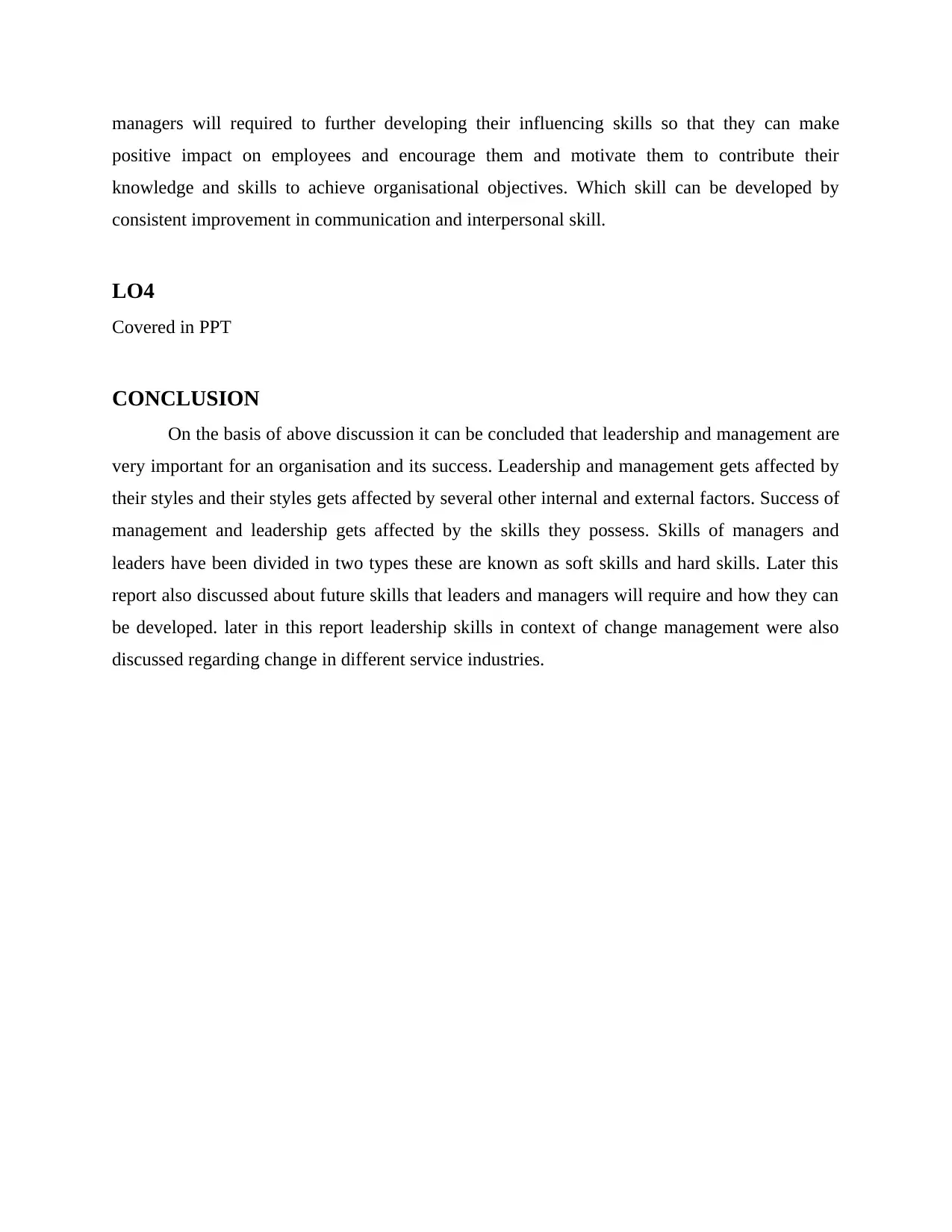
managers will required to further developing their influencing skills so that they can make
positive impact on employees and encourage them and motivate them to contribute their
knowledge and skills to achieve organisational objectives. Which skill can be developed by
consistent improvement in communication and interpersonal skill.
LO4
Covered in PPT
CONCLUSION
On the basis of above discussion it can be concluded that leadership and management are
very important for an organisation and its success. Leadership and management gets affected by
their styles and their styles gets affected by several other internal and external factors. Success of
management and leadership gets affected by the skills they possess. Skills of managers and
leaders have been divided in two types these are known as soft skills and hard skills. Later this
report also discussed about future skills that leaders and managers will require and how they can
be developed. later in this report leadership skills in context of change management were also
discussed regarding change in different service industries.
positive impact on employees and encourage them and motivate them to contribute their
knowledge and skills to achieve organisational objectives. Which skill can be developed by
consistent improvement in communication and interpersonal skill.
LO4
Covered in PPT
CONCLUSION
On the basis of above discussion it can be concluded that leadership and management are
very important for an organisation and its success. Leadership and management gets affected by
their styles and their styles gets affected by several other internal and external factors. Success of
management and leadership gets affected by the skills they possess. Skills of managers and
leaders have been divided in two types these are known as soft skills and hard skills. Later this
report also discussed about future skills that leaders and managers will require and how they can
be developed. later in this report leadership skills in context of change management were also
discussed regarding change in different service industries.
⊘ This is a preview!⊘
Do you want full access?
Subscribe today to unlock all pages.

Trusted by 1+ million students worldwide
1 out of 14
Related Documents
Your All-in-One AI-Powered Toolkit for Academic Success.
+13062052269
info@desklib.com
Available 24*7 on WhatsApp / Email
![[object Object]](/_next/static/media/star-bottom.7253800d.svg)
Unlock your academic potential
Copyright © 2020–2026 A2Z Services. All Rights Reserved. Developed and managed by ZUCOL.




